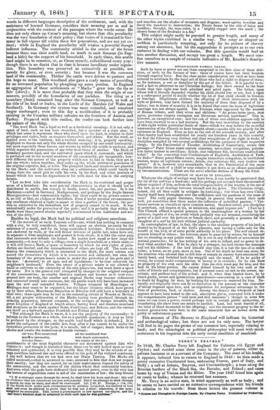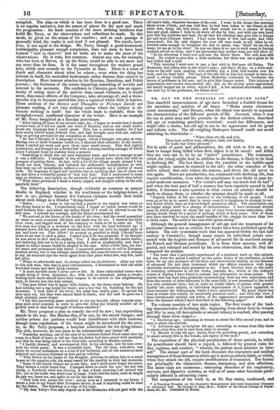TERRY'S TRAVELS. *
IN 1842, Mr. Charles Terry left England for Calcutta via Egypt and Ceylon; and resided some three years in the city of palaces, either on private business or as a servant of the Company. The state of his health, it appears, induced him to return to England in 1845: he then made a pretty extensive Continental tour, embracing France, part of Italy, and Sicily ; a call at Athens, Smyrna, and Constantinople ; a tour along the Russian borders of the Black Sea, the Danube, and Poland ; and came home by way of Vienna and the Rhine. The year 1847 found him again en route to India; whence he returned last summer.
Mr. Terry is an active man, in mind apparently as well as body; and he seems to have carried on an extensive correspondence with his friends in relation to his travels : from those letters the present volume is I *Seem* aaa Thoughts in Sereign Lands. By Charles Terry. Published by Pickering.
compiled. The plan on which it has been done is a good one. There is no regular narrative, but the names of places fix the spot and mark the progression : the book consists of the more striking incidents that befell Mr. Terry, or the observations and reflections he made. By this mode, he gives us the cream of his rambles ; and as each passage is generally brief, the reader is not tired if not pleased. The result, how- ever, is not equal to the design. Mr. Terry, though a good-humoured, indefatigable, pleasant enough companion, does not seem to have been trained "how to observe," and he lacks art to make the most of his observations. He is true, but common. Almost any one, for example, who has been at Havre, or up the Seine, would be able to see more and say more than he does. It is the same throughout the modern grand tour, which now extends to the Pyramids at least. There is a want of depth and character about what he selects ; even when the thing has interest in itself, his unstudied bonhommie rather flattens than raises it in description. More interest attaches to his Russian, Danubian, and Polish journey ; the freshness of the scenes imparting something of novelty and interest to his accounts. His residence in Calcutta gave him an oppor- tunity of seeing more of the natives than casual visitants, or, it would seem than many officers of the Company, take advantage of; and a three- months trip to Arracan carried him into a region of which little is known. These sections of the Scenes and Thoughts in Foreign Lands are pleasant reading, if not very striking unless where the subject is ob- viously striking in itself: but the whole book is readable, from the straightforward, unaffected character of the writer. Here is an example of Mr. Terry benighted at a Russian post-house.
"After taking off some of my several coats, &c., I began to wonder howl should procure food, as I did not speak one word of Russian, and no one could under- stand any language that I could speak. This was a serious matter, for I had been nearly twelve hours without food, and had brought none with me, calcula- ting on getting provided by my companion at Akereaan. At last I thought of a language of signs, which I brought into play at once. Having two or three Cossacks round me, I directed their attention to my month, when I rattled my teeth and gave them some small money. This they rightly understood, and brought me a brown loaf with a strong-smelling sausage, of which latter I pleased them by making them a present.
"Something to drink was my next important want, and how to manage to get it was a difficulty. I thought of lots of things I should have liked, but with no prospect of getting them. At last, with a lot of the village people around I bel- lowed out such bhaous,' and imitated the milkmaid's manipulations so well, that they ran off immediately, milked a cow, and brought one a pitcher of warm milk. My language of signs and symbols was so catching that one of them ran up and down a wonderful gamut of 'kak kak kak.' This I understood to mean eggs or chickens; and rightly so, for presently I got some eggs which they boiled.
" With these provisional made a hearty supper, and dropped asleep on the sofa, painfully tired."
The following description, though evidently as common as pauper deaths in England, whether in the workhouse or the lodging-house, is new to us' perhaps because few Calcutta visitants trouble their heads about such things as a Hindoo "dying-house."
"Baboo came to tell me that a person in my employ was taken to the dying-house to die. I immediately said, I hoped no unfair means would be used towards him; and asked my native friend if I could be allowed to see the sick man. I ordered my carriage, and the Baboo accompanied me.
"We arrived at the house on the banks of the river ; and the crowd assembled as usual on such occasions fell back and made way for me. I entered the little close room, and begged most of the company to retire to let in some air. The sick man was lying on a mattress on the floor, with his head bolstered up: I stooped down, felt his pulse, and watched his drowsy eye until he caught sight of me, and knew me. Poor fellow! he seemed so grateful to think I should have come to see him in such a place. I asked him if he was prepared, if he thought he was about to die? and he replied, 'Yes.' I then called for the native doctor; and believing him not to be in a dying state, I said so emphatically, and that I hoped no unfair means would be adopted in his case. After a little time, the doc- tor came, and pronounced him better. I requested permission to call in European medical advice, but it was refused:nevertheless, the man did recover; and, strange to say, he returned into the world again from that place which few, very few, have left alive.
"When we afterwards met, he always called me his deliverer. After my visit to this sick man, who was in good circumstances, I determined to visit the other wretched rooms and their dying inmates. "A more horrible scene I never saw or felt. In these unfurnished rooms were people dying of fever, dysentery, &c., with only an attendant, asleep or awake, waiting until death should leave their corpses to be carried to the neighbouring pyre, or thrown into the holy stream. One poor fellow was in agony with cholera, on the damp stone balcony. He had nothing but a rag round his waist; and a boy was by, watching for his last moments. I took hold of his wrist; his pulse was nearly gone; he opened his eyes upon me, but they were almost fixed in death; and the look he gave me I shall probably never forget. "I left this harrowing scene resolved to try my humble efforts towards stop- ping such cruel customs, in order to give the dying the friendly comfort all so greatly need at that last struggle of human existence."
Mr. Terry proposes a plan to remedy the evil he saw; but superstition stands in the way. The Hindoo dies, if he can, by the sacred Ganges ; and neither priests nor patients would bear interference with their customs, though some regulations of the house might be introduced for the poor, or, as Mr. Terry proposes, a hospital substituted for the dying-house. The rich, however, do not seem to be substantially any better off.
"Yesterday morning, one of the sons of an intimate Indian friend came into my room, in a flood of tears, to tell me that his father had been seized with paralysis, and that he was being taken to the river-side, according to Hindoo custom. " I hastily dressed, and accompanied him in his carriage, and we soon over- took the whole party. It was a mournful sight. The old man, still alive, was borne by several attendants on a kind of low bedstead, and all the numerous male relatives and servants followed on foot and in vehicles.
"They halted on the banks of the Hooghly, previous to taking him to a small house on the opposite side, the usual resort for the wealthy in their last moments.
"Some of the family wished me to see him; and I shall never forget the scene. They formed a circle round him. r stooped down to catch his eye: the sun was rising, a Northerly wind was blowing, it was a fresh morning—all around was life ; yet in the midst was death near at hand. I still held his hand, until at length he saw me, knew me, and spoke to me for the last time. "They took him across the river ; and as soon as I returned to my house, I wrote a note to my friend their European doctor, to ask if anything could be done for the Baboo. The following is a copy of his reply. "My dear Terry—You may depend on it the Brahmins will not part with the old man's body, whatever becomes of his soul. I went to his house this morning about seven o'clock, and was told that he had been taken to the Ghent on the other side, being the holy place ; and there would not be a chance of doing him any good, unless I were to sit down all day by him, and with my own hand give him his medicine and food; for all that his relations dare give him is Gangs gal and mud (Ganges water). I had some hopes of him last night, had they persevered; but the only request the poor old man made to me, when he re- covered sense enough to recognize me and to speak, was, 'Don't let me die at home, let me go to the river.' So you see there is no use in such cases in forcing medical advice on them, and I am persuaded they neither want nor will allow it.' "In the afternoon I went over and met the doctor there. The sick man still lived. He wished to give him a little medicine, but there was not a glass to be had within half a mile.
"This morning I went over to pay a last visit to the poor old Baboo. The Brahmins had taken him to the water's edge ; and there he lay, on a little mat- tress on the soft mud, panting, with nothing but a little thin muslin over his body, and his head bare. The rays of the sun fell on him hot enough to have in- jured a strong healthy person. Three Brahmins continued to vociferate the names of goddesses in his ears, and to give him Ganges water. This mixture of superstition and cruelty disconcerted me; but, as the closing scene approached, the family begged me to retire, which I did. A few minutes afterwards, amidst one loud cry to the goddesses, the Baboo died."































 Previous page
Previous page